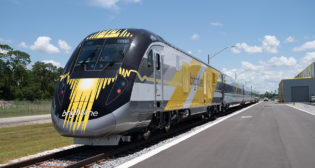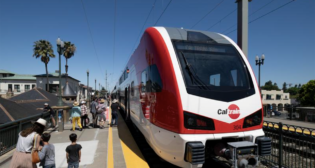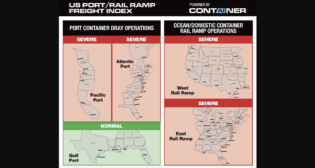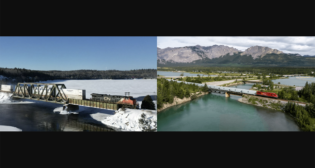
Canada’s Trudeau reaches heavenward for new Transport Minister
Written by David Thomas, Canadian Contributing EditorCanada's freshly elected Prime Minister, Justin Trudeau, reached heavenward Nov. 4, 2015 in selecting the country's new Transport Minister, former NASA Space Shuttle astronaut Marc Garneau. The 66-year-old Garneau was Canada’s first man in space, logging 677 hours during three flights between 1984 and 2000.
G arneau becomes the country’s chief transportation policymaker and regulator after a decade in which Transport Canada gained a hard-won reputation for incompetence, culminating in the 2013 catastrophe at Lac-Mégantic, Quebec, when a runaway train loaded with Bakken crude initiated the series of oil train calamities that exposed the inadequacy of rail regulation in North America.
arneau becomes the country’s chief transportation policymaker and regulator after a decade in which Transport Canada gained a hard-won reputation for incompetence, culminating in the 2013 catastrophe at Lac-Mégantic, Quebec, when a runaway train loaded with Bakken crude initiated the series of oil train calamities that exposed the inadequacy of rail regulation in North America.
The former astronaut, a highly regarded elder in a cabinet otherwise characterized by youth and femininity (15 of the 30 ministers are women), takes over from a succession of weak transport ministers appointed by the defeated Prime Minister Stephen Harper, whose domineering leadership ensured that rail policy favored oil and grain shippers at the expense of safety and service efficiency.
Garneau, then a powerless opposition member of parliament, visited Lac-Mégantic on the first anniversary of the disaster that killed 47 people and incinerated the town core. He declared then that the conflagration was the result of bad railroading compounded by the false characterization of the cargo as merely inflammable rather than extremely explosive. “Rail transport is essential to the economy of our country, and it is the responsibility of the Canadian government to ensure that our railway network is the safest in the world.”
Now, that responsibility is entirely his. A rigorous housecleaning of Transport Canada’s bureaucracy would be a good place to start: Not one employee was fired or disciplined by the previous government, despite a succession of harsh reports by the country’s auditor general and information commissioner, who denounced the department’s self-serving secrecy and regulatory ineptitude.
Equally important to Canada’s intercity rail and urban transit sectors is the naming of Amarjeet Sohi as Minister for Infrastructure. The Edmonton MP is responsible for implementing the substantial program of transportation work that was the centerpiece of Trudeau’s economic campaign promises.
Born in India’s Punjab province (he is one of four cabinet ministers of Sikh ethnicity), Sohi was once imprisoned and tortured in his native country on false suspicions of terrorism. After immigrating to Canada, Sohi was elected to the Edmonton City Council, where he developed a passion for light rail, serving as the city’s representative on the Canadian Urban Transit Association. He will be responsible for doling out federal funds by the millions over the coming three years for transit and intercity rail infrastructure projects.
Trudeau made equally bold choices for other key ministries: Canada’s defense minister is a turban-wearing Sikh and a veteran officer of the Afghanistan war, while Maryam Monsef, the minister responsible for making Canada’s British-based parliamentary system more democratic, is herself a refugee from Afghanistan.
After a decade of divisive rule by angry old white men, Canada has recovered its progressive identity as a youthful and ethnically open society committed, as were its founders in 1867, to steel wheels on steel rails for national unity and prosperity.



